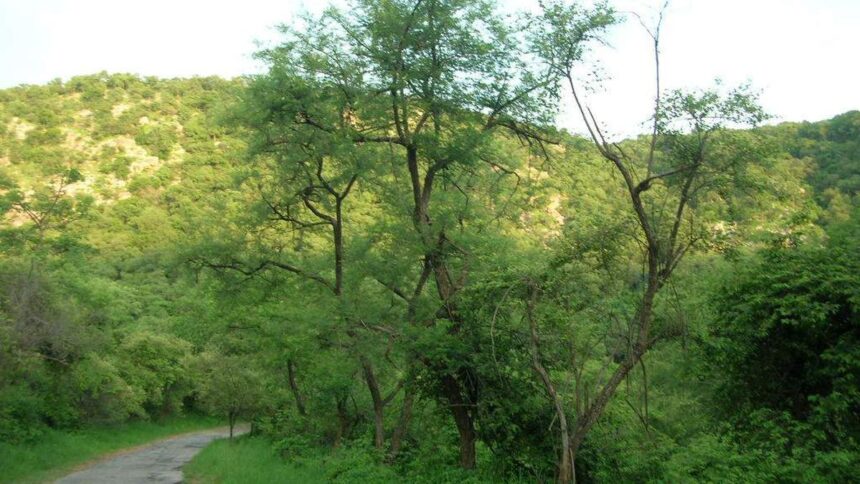In Nilwande village, 50 kilometres away from Nashik city, 35 years old Chhaya Thete wakes up early morning to send her two children to a private English medium school around an hour away from her village. Tiffins packed, meals cooked, she then heads to her farm to see if the stems in her vineyard have changed colour. Due to the unseasonal rain this time, she is worried that there will be diseases on the leaves and that the yield might reduce. But there is one thing she looks up to this year – the increased income on her export quality grapes. She is kicked about the India – UK Free Trade Agreement, whereby Indian grapes will now enter UK duty-free. For this woman farmer with a marginal land holding of close to two acres, it promises better income, better standard of living and some disposable income.
The district of Nashik is called the grape capital of India. In 2023-24, India exported over 3 Lakh metric tonnes of grapes, valued at over $400 million. Maharashtra is the its biggest producer. UK has consistently been one of our top importers. And most of the grapes grown in the fertile land of Nashik make their way to the European market.
With the India-UK Free Trade Agreement, Indian grapes will now become more competitive in the European market and will stand a better chance in front of competitors like South Africa, Chile, which have to exporting to UK without any tarriff. Our grapes were levied a tarriff of eight per cent earlier. But for the small and marginal farmers, a majority in India, the better chance of exploiting this opportunity comes with the power of collective farming.
Over the last decade or so, Chhaya, along with her husband Dnyaneshwar Thete, has repaid a bank loan, bought more land for grape cultivation, and has built a small bungalow on the land where a modest house with thatched roof stood once. She cultivates some new and exclusive varieties of grapes like Ara. And Chhaya Thete is not alone.
In the neighbouring village, 49 years old Vijay Wadje and his young son are equally excited. They have been cultivating some of the exclusive grape varieties for export for a while now. And the experience of sending it for export has been different from the experience of selling the produce in the domestic market.

“I have been doing grape farming for 25 years now. Earlier, I used to cultivate Sonaka variety. I did it for almost 10 years, and sold the produce in the domestic market. But not only did I get poor rate, the income was also not fixed. We had to pack the grapes ourselves and take them to the trader, who would hardly ever pay on time. But then, over a decade ago, I saw people around me cultivate Thompson variety. I saw them prosper. So I decided to try my hand at it. And since then, there has been no looking back. Today, I cultivate Thompson, Ara varieties. The produce goes to the company. We get timely payment as per the quality of the produce. There is strict testing and quality control. The higher the quality of my grapes, the better the price,” said Vijay Wadje. He owns 2.5 acres of land. Each acre gives him 100 quintals of grape. Each kilogram earns him anywhere between Rs 60 to Rs 100, depending on the quality.
His son, 23 years old Rahul Wadje, who has completed B.Sc Physics, joined his father in agriculture three years ago while doing a part time agriculture diploma. He is one of the few youngsters who want to continue farming. Others are moving away from the family farms, looking for private or government jobs. “I want to continue farming. But that is not sufficient. I want to simultaneously start an agriculture-allied business, like providing hardware or mulching paper, for agriculture,” he said with excitement in his voice and a twinkle in his eyes. He has been consciously carrying out experiments in the farm to improve the quality, and is acutely aware of the strict quality control measures farmers have to take for making the produce which passes the stringent export norms.
“We test our soil five times a year. We also test our vineyard regularly. The petiole testing is crucial. The European market is very strict. They test the taste, colour, variation. They want each berry to be the same size, to have the same taste and colour. They don’t want chemicals in their grapes. We follow all the international norms. Our grapes are the best quality for eating. Even we eat them right from the vineyard. If we buy grapes from the market, we need to wash them thoroughly. But that is not the consideration for the export quality grapes we grow
The secret behind their changed fortune is collective farming. They are all a part of the 14,000 farmers associated with a Farmer Producer Company – Sahyadri Farms. In a country where over 90 per cent farmers are small and marginal farmers, the collective has given them the bargaining power and the strength to generate volumes to stand in the competitive international market.
‘Do or die’ situation
“We are in a do-or-die situation when it comes to being competitive in the international market. The only solution for a country where most of the farmers have less than one hectare land holding is collective farming. Without that collective approach, we can’t create your own ecosystem. We can’t make it profitable. That ecosystem should be competitive at a global level. Then only there is real prosperity,” said Vilas Shinde, chairperson and managing director of Sahyadri farms. The company is one of the leading FPCs in India and the country’s largest grape exporter with 17 per cent market share. It grows more than 30 new varieties including 19 exclusive patented varieties. In 2025, it Sahyadri has recorded sale of over Rs 1900 Crore. Over 14,000 farmers are associated with Sahyadri for grape production.

The company said that the FTA will lead to at least 15 per cent better returns for the farmers. “For grapes, India will have great advantages. Volume will increase due to fair competition. Along with grapes, there will be bigger opportunities for other horticulture commodities pomegranate, mango, citrus fruits. It will lead to end-to-end ecosystem, improving standard for customer requirement. This will lead to greater learning which will help farmers not just in the UK, but in other markets like Japan, USA. It will help in domestic market as well. The demand for premium fruits is increasing. Food safety related standards will force the farmer community give better quality,” he said. Every year, Sahyadri exports 22,000 metric tonnes of grapes. 30 per cent of it goes to the UK market.
Published – August 15, 2025 02:40 am IST


















